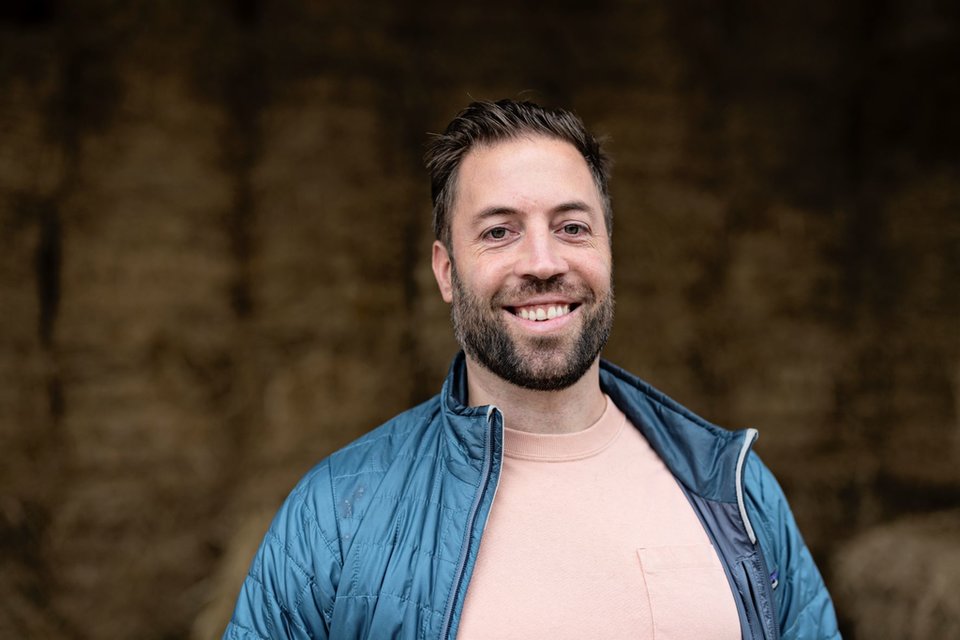Interview
Mark (35): “For our new house, sustainability was a must”
With a pension with Nationale-Nederlanden, you help build a sustainable future. But scheme members are also committed to sustainability in other areas. How Mark (35) does it? “I find sustainability important, but also want to keep enjoying life.”
Mark Giller lives in Geldrop with his girlfriend and two daughters. But they also often head to Spain, where Mark is busy with his own business: an online platform that encourages farmers to grow their fruit and vegetables sustainably and sell them locally.

Where does your interest in sustainability come from?
“My drive for sustainability comes mainly from my work. I have worked as a business developer in construction for a long time. During that time, I learned a lot about sustainable materials and recycling. The more I worked on that, the more I wanted to live more sustainably myself. In order to also contribute a little bit to a better world myself.
When I had children, I started living even more consciously. I feel a strong responsibility to leave the world a better place for my two daughters. Many parents will be able to relate to that. You want them to have a pleasant future without extreme climate change.”
How do you incorporate sustainability into your daily life?
“When we started looking for a new house, sustainability was a must. So we bought a house that already had solar panels on the roof. For lighting, we used only energy-efficient LED lights. And we always keep the heating low at our home. I don’t mind that, but it does sometimes trigger some debate with my girlfriend. She is Spanish and likes high temperatures, haha.
I also started my own business this year: Farmlike. Because of my business, sustainability is now part of my daily work. We encourage and help farmers sell their fruit and vegetables locally. By signing up to our platform, farmers can catch the attention of customers in the area who are searching for local products through the app.
Because local sales require less transport, farmers emit less CO2. We also put farmers in the spotlight who apply particularly sustainable production methods. This brings in more business for them.”
Do you sometimes find it difficult to make sustainable choices?
“Absolutely. We travel a lot, especially to Spain. That’s where my girlfriend’s family lives and where I do business. All those flights are obviously not sustainable. We have done it by car a few times, but with today’s petrol prices, it has become unaffordable. In the future, we hope to make the journey by train. But that connection is still very poor right now.
Further, I enjoy a good piece of meat or fish every now and then, although I am also open to other sources of protein. During my studies in Mexico, for example, I regularly ate grasshoppers. They are much more sustainable than a steak.
Yet I also find it important to keep enjoying life. See more of the world, connect with other cultures, and eat good food. It will always be a trade-off.”
As an independent entrepreneur, you have to arrange your own pension. Is the climate an important consideration for you when it comes to your pension?
“I’m going to look into that soon. So far, I have accrued pension at several different employers. The level of sustainability of these pension pots varies. Now, for the first time, I have the freedom to choose where I want to accrue my pension. How exactly I will do it, I don’t know yet. But that I want to accrue my pension with a focus on the climate is certain. For example with a pension fund that invests in sustainable agriculture or renewable energy.”
Do you find it important for financial services companies to invest their clients’ money sustainably?
“Yes, very important. They have a responsibility to use the money in their care in a sustainable way. Fortunately, banks’ and pension funds’ investments are becoming increasingly more transparent. This forces them to invest more sustainably. Because if people see financial services companies investing a lot of money in fossil energy, social pressure will build up quickly. I think the importance of sustainability has already dawned on most people.”

Drie generaties over duurzaamheid
How important is the issue of sustainability to other generations? In addition to Mark, we also spoke to student Babke (24) and writer Christine.
Feedback

You can create new feedback forms in the Feedback Tab of this project